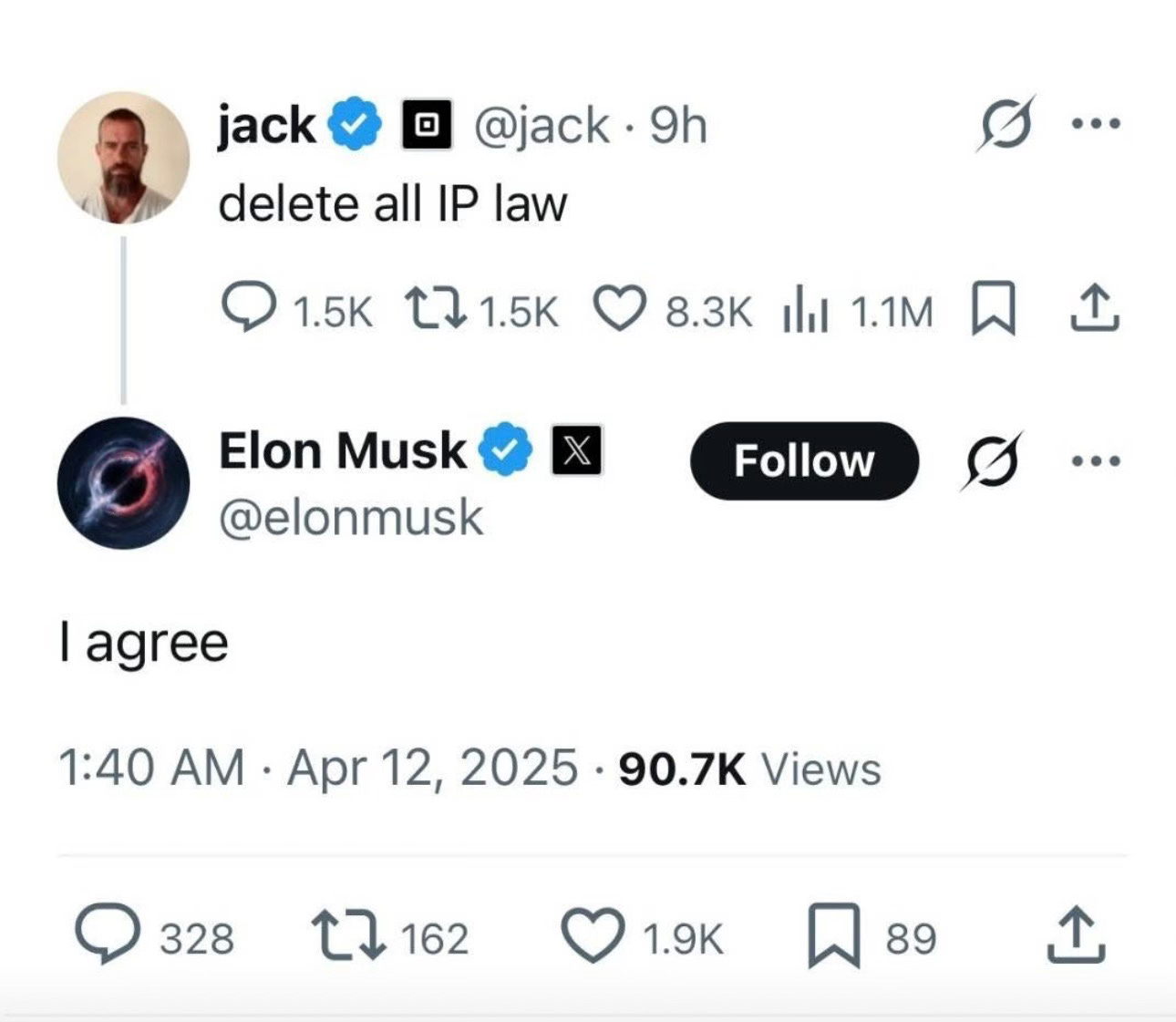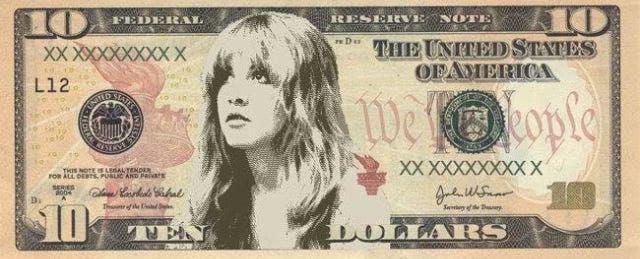The Money Business
"The Music Business became the Money Business...and that's what ruined the Record Business."
The above quote is from legendary promotions man Paul “Rap” Rappaport, who worked for Columbia Records for over 30 years starting in the late 60s. It’s from his recent in-depth interview on the excellent Bob Lefsetz Podcast.1 Rap’s new book, Gliders Over Hollywood: Airships, Airplay, and the Art of Rock Promotion is wonderful, super entertaining, one of the most vivid and honest accounts of the pre-digital music business I’ve read. He’s one of the best who ever did the job, and his book is a wild ride through the chaos and grandeur of rock’s golden age.
After a long, successful career at Columbia through a litany of label presidents, Rap took a buyout and pretty much left the record business in the early 2000s without regret. The business had changed, all the money, the corporate money, screwed things up. From Rap’s peak Boomer point of view he entered a business in during a time that shaped the culture and affected world events. He was there, working with some of the greatest icons of 20th Century culture: Dylan, Rolling Stones, Springsteen, Pink Floyd, Paul Simon, Billy Joel, Aerosmith, etc. Music created the culture, a source of enormous self-importance for so many people of that era. Still, they have a point. Rap has a point. It’s hard to argue with that list as the tip of the iceberg..
In Rap’s telling, from the 80s on it became more and more the “money business," barely recognizable from the idealistic business of the Boomer glory days. With a growing focus earnings, margins, and data, executives had less patience for substantive, meaningful artists and more appetite for huge hits. It wasn’t any fun, and it wasn’t about anything anymore. Except money.
It’s a struggle to think how money could further corrupt the mobbed-up record business of the 1950s and early 60s, known for screwing Black artists out of royalties, the Payola scandal, and single-digit royalty rates. The business didn’t become any more corrupt. The business changed because of the scale, the opportunity to make billions from mega-hit albums. In the late 80s, the CD became the dominant format, opening all sorts of new opportunities for companies to make money. Music fans re-purchased their vinyl collections on this exciting new format, leading to a huge boom in catalogue sales. MTV and corporate radio reached ever large audiences with bigger blockbuster hits.
For a brief time at the dawn of the technology, CDs were somewhat expensive to produce. However, as the price of materials dropped with mass production, you’d think the price of a CD would come down. Instead, they went up. Singles formats were eliminated. By the 90s if you loved a song on the radio and wanted to hear it again, you had to go to your local big box store and buy a bunch of songs you may or may not find interesting. In this CD boom era, the record business became a truly global industry with tens of billions in annual revenue. That’s around the time Sony purchased CBS Records (including Rap’s employer Columbia Records) and formed mega-conglomerate Sony Music Entertainment. This began a trend of consolidation, with non-music companies such as Seagram’s and Vivendi began acquiring major music companies.
The corporate culture, the focus on numbers, quarterly earnings and tight margins, in Rap’s narrative those are the things that killed the record business. Maybe that’s what killed the spirit of the business, those freewheeling, free-spending last days before the fall of the Empire, when coke and booze fueled the all-night parties celebrating win after win. But the business - the record business as well as the radio promo hustle - remained very much alive and well through the 90s. Things became increasingly corporate because music companies made SO much money. Money attracts money. Consolidation is inevitable, with business models designed for maximum earnings and ownership of intellectual property. Corporate or not, in the late 90s the music business - especially the rock business - printed money. The labels and publishers owned almost all the music.
That’s the business we’re supposed to compare to today’s business. Maybe we’ll get back there to an inflation-adjusted number that equals the CD era. Maybe it’s just as well we don’t, because that was a brutal time for artists. The record business revered superstars who delivered superstar product that kept the money firehose on blast. But for the rest of the artists fighting to build an audience? They were often treated like shit. Rap is right: it was a time for money making, not art.
I saw the 90s business from a couple very different points of view. On one hand, I was a struggling indie artist at the same time I played in a successful major label act. I witnessed the poor treatment of artists first-hand. The whole time I was trying to make it, I made ends meet by working at cool record stores where my encyclopedic musical knowledge came in handy on the sales floor. By the end of the 90s, the boom times, I heard would-be customers tell each other not to buy an album because they could just burn a copy. “Don’t spend your money - I’ll burn you one,” we heard that every day. The first mention I heard of Napster, in 1999, came from a customer at Magic Platter in Birmingham, a guy who came in the store at least a few times a week. “It’s unbelievable,” he told me. “I found your records on there without any problem…it’s all free.” After that conversation, I don’t think he ever set foot in the store again. The writing was on the wall.
Anybody paying attention knew the old record business was dying. That locked up, radio and MTV-driven, CD-obsessed business had a sell-by date, even as most people in the industry couldn’t see it (yet). When the cracks began to show, how did the greedy music business respond? Did they partner with tech entrepreneurs to conceive a new business model that would survive the coming disruption? No they did not - not in any meaningful way. The business went to war to try to save a business model that was already effectively dead. Their strategy was to sue their own customers and attempt to push rights management software to force people to continue to buy their products. Tech innovators saw the absurdity of all this, and they seized an opportunity.
I spent time with a lots of smart people at the intersection of music and tech in the early 2000s. That’s what shaped my values, and that’s when I became fascinated by the future of music. The tech people I knew came from punk rock, like me. They understood that the punk underground was a better business model than the mainstream. Among other insights I gained from this formative period, I became convinced that on-demand streaming was our inevitable future, the only sensible way forward. It’s what the coming wave facilitated, and what the coming wave would demand. Tech developers could literally see the future. They knew just about how long it would take for mobile music to become accessible to all. They understood we had a short window to build a business model or else it would all be free on the Internet - the true death of the record business.
I had an epiphany in the early 2000s that a consumption/access business, recorded music as a utility rather than a product, would finally create some stability for the industry. We’d had so many disruptions as new formats came online. From records to cassettes to CDs to MP3s to…access. What comes next after access?2

I’ve struggled with the idea that big tech companies like Apple and Spotify would are somehow white knights who save our business. Those companies’ values don’t align with artists, they never will. The music business got in their own way and created an opportunity. Tech companies saw the solution and the opportunity. But they didn’t save music because they cared about music per se. Instead, they saw an opportunity to make infinite money from micropayments and to replicate the model across other media.
I’m grateful those companies helped develop business models that got us through and helped us survive, but I trust the tech oligarchs even than the corporate overlords who conquered the music business in the 80s and 90s. Or maybe I distrust them the same amount because they are essentially the same. Money people. Fundamentally, these folks care a hoot about creative people, their work, or the culture they create. They care about money and power. Look at that screenshot above from Elon Musk’s X platform - deplorable. These creeps are actively hostile to artists and their art, just read their words! Without IP there’s no business, and they know that. They just want the data to use however they please, to make money, and to amass power. Don’t get me started on where it’s going next, and we opened that door by letting them find the solution to our problems. We’re learning now just how deeply these tech oligarchs resent creative individuals. They’ve purposefully devalued our works, and any beneficial outcomes have been lucky accidents. On that note…
But why does stability matter? The industry has used disruption as an opportunity to take more from artists. They reduce royalties for “new media” formats. They use new formats as an opportunity to jack up the price to consumers. This sort of chaos makes it difficult to determine the value of a music copyright, because who knows what will happen in the future? Streaming has created this stability, and now everyone can more accurately determine the value of a work.
When you combine the accessibility and low-cost of digital distribution with the stability of streaming, suddenly it’s far easier to create and assess asset value. For so-called “evergreen” copyrights - songs and recordings that hold their value - streaming has created a much more reliable framework to assess value. Predictability of music consumption over many years has attracted traditional capital. Music royalty streams and copyrights have become an attractive asset class for investors. That’s what really ruined the record business. Or saved it, depending on your point of view.
I have clients, independent acts, who have tracks on streaming services that stream over a hundred thousand times every day - sometimes a lot more. Hit songs look different than they used to. In Rap’s day at Columbia, the only acceptable number was number one. These days a song that’s never charted, that never made a dent in the mainstream, can earn millions for a fully independent artist, an artist who owns both the song and the recording. When that happens, investors show up with the checkbooks. When that happens to an independent artist, they’ll probably be very grateful that they didn’t sell their future copyrights in exchange for a shot at the big time.
Who are these investors? It used to be bigger institutional investors purchased entire catalogues for tens of millions or more. People are always surprised to learn that Concord is owned by the State of Michigan Retirement System - how does that happen? It’s a fund that invests capital. It could be a college endowment or a VC fund. These institutional investors don’t want to be in the music business, they are buying a revenue stream. They won’t mess with an artist’s work because the people have no real interest in the creative side of music. Money has seeped so deep into the music business that it’s become a conservative investment. Music revenue streams might as well be pork belly futures - it’s another asset that helps to grow capital. Nothing sexy. Here’s the model: study the data, assess what the work is likely to earn in the future, confirm the chain of title, and then make a lowball offer against projected future earnings. It’s a safe, smart investment for patient money. For the independent artist, it can be truly life-changing. One Spotify hit that locks into an algorithmic pattern nets an artist millions. That’s the new business, that’s why everything is changing. That’s the death rattle of the record business giving way to the Artist Business.
We’re in the Wild West now. It’s glorious to watch some of the rotting, corrupt parts of the industry turn to dust. Spotify’s Discovery Mode is not Payola. Payola was literal gangsters and grotesque excess at the expense of artists. Discovery Mode is an optional tool that reduces passive stream royalties in exchange for algorithmic push - something I’ve seen make an artist’s career from nothing. The beauty of the streaming age is that an independent artist who owns their own copyright actually benefits from the value they create. Any tool that helps them do this without a label’s support is empowering. I’ve seen so many examples of artists going from nothing to making a nice living outside the traditional business. The future of the major label / major publisher catalogue business is murky, because any smart artist knows that in most cases selling a copyright to a label - especially one of undetermined value - is a bet against themselves.
With so much changing, some things have remained the same, and will remain the same with or without an AI revolution. No-talent artists sometimes enjoy viral success, just as one-hit wonders from the past have made money in music without any talent to back it up. Real talent, real artistry, real passion will still carry the day. Rap gets this. His advice to young artists who ask him for tips about how to make it in the music business - “be great.” It isn’t about the money, it’s about great music that changes the culture. “If you can [be great], if have something real to say, people will want to be there and they’ll come back…your job is to be great, and don’t stop until you get there.” In today’s super-saturated, fast-moving culture, music has to be great.
I don’t really mean to rip on major labels and publishers. They’re doing a better job embracing change, and embracing new tech. If labels weren’t willing to change their deals to compete with independent alternatives, nobody worth their salt would ever sign a deal. It’s possible for a truly independent act to have success, but it’s never easy. And it’s usually expensive. Artists need investment, they need infrastructure, they need resources. Most of all, they need good people. They need to provide new generations of skilled and talented people like Paul Rappaport, people who bring knowledge, love, dedication, work ethic, and unbelievable skills to that constantly moving target of sales, publicity, promo, and marketing. They need real artist development, creative people who understand the artistry. They need help because even with a broader definition of success, it’s more competitive than it’s ever been.
Here’s how it should work: Artists develop their music and build an audience. Companies or entrepreneurs identify the best projects, make fair deals, and invest money and resources. They provide the necessary backing to build a lucrative career, and then company and artist share the money in an equitable split. Eventually, the artist regains control of the copyrights so that the asset value is theirs to do as they please. Does that sound like a pipe dream? Not to me. It’s the business people are actually building right now, including the major labels. In the future it will be on the artist’s terms, and the companies and entrepreneurs will either create actual value in exchange for their cut or they’ll perish.
Here’s a plug: The Bob Lefsetz Podcast is one of my favorites. I’ve read Lefsetz for decades; I often agree with him but not always. I think he’s a better interviewer than writer, and he’s especially good when interviewing music executives.
Now we know the answer, gen AI. Or maybe even streaming music directly into our brains. In short, nothing good.






Back in the nineties I used to tell the artists I worked with a label is a bank. You use your music as collateral for a loan. Stop fantasizing about labels. It’s a fiduciary relationship. Nothing more. Most didn’t want to hear it.
“I have clients, independent acts, who have tracks on streaming services that stream over a hundred thousand times every day”
Can I get an example of this? Just curious. Thanks.